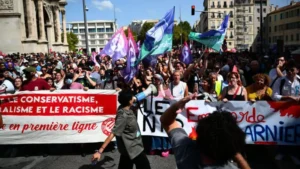Michel Barnier Protests Spark Nationwide Unrest
Tens of thousands of people are protesting across France against the appointment of Michel Barnier as the new prime minister. Barnier, a right-wing politician, was selected after an inconclusive election where the left-wing parties won the most seats. Despite this, President Emmanuel Macron chose Barnier over the left’s candidate, causing widespread outrage.
Demonstrations have erupted in cities like Paris, Marseille, Nantes, Nice, and Strasbourg. Trade unions and left-wing political parties organized these Michel Barnier protests. Their anger stems from the rejection of their preferred candidate for prime minister by President Macron.
Barnier, well-known as the EU’s former Brexit negotiator, has expressed a willingness to form a government with politicians from across the political spectrum, including left-wing parties.
The Shift of Michel Barnier Protests
Barnier, once dubbed “Mr Brexit” for his role in negotiating the UK’s departure from the EU, has now become a key figure in French politics. While his nomination buys time for President Macron, it has done little to resolve the deep political divide in the country.
Jean-Luc Mélenchon, a well-known figure from the radical France Unbowed party, has been at the forefront of the Michel Barnier protests. He called for the “most powerful mobilization possible” and led a national march in Paris. Mélenchon gave an impassioned speech from a float with the words “For democracy, stop Macron’s coup” displayed prominently.
The slogans being chanted by demonstrators include “denial of democracy” and “stolen election.” The core frustration is that Lucie Castets, the left’s chosen candidate for prime minister, was dismissed by Macron. Castets was seen as the legitimate choice by her supporters, yet Macron argued she had no chance of surviving a confidence vote in the National Assembly.
Barnier’s Path Forward – Michel Barnier Protests
Despite the opposition, Michel Barnier might have a pathway to stay in office. The far-right party, National Rally, which secured a significant number of seats in the election, has hinted they won’t automatically oppose Barnier. This stance could enable him to survive a confidence vote in the Assembly. However, this situation has sparked sharp criticism.
Critics argue that Barnier’s government may end up relying heavily on support from the far right. Lucie Castets herself pointed out this concern, stating, “We have a prime minister completely dependent on National Rally.” The implication that Barnier could align with far-right forces has alarmed many left-wing and centrist politicians.
Public Reaction and Barnier’s Agenda
As Michel Barnier protests raged in the streets, Barnier spent part of his Saturday visiting a children’s hospital in Paris. While there, he stressed the importance of public services. However, he was quick to temper expectations, telling healthcare workers that his government “is not going to perform miracles.” This statement was reported by BFMTV, a local news broadcaster.
The juxtaposition of Barnier’s calm, composed visit to the hospital with the anger boiling over in the streets highlights the deep divide in France. His assurances on public services, while meaningful, do little to quiet the cries for political change coming from the protesters.

Uncertain Future – Michel Barnier Protests
France’s political future remains uncertain. With Michel Barnier at the helm, the country faces a period of potential instability. His ability to govern effectively will depend on whether he can build a coalition strong enough to withstand challenges from both the left and right.
President Macron’s decision to nominate Barnier, despite the left’s electoral victory, has led to a sense of betrayal among many voters. The Michel Barnier protests are not just about the appointment of a prime minister. They reflect a deeper frustration with the direction of French politics and the balance of power in the country.
Meanwhile, Barnier’s efforts to reach across the political divide may face obstacles, as distrust runs deep on both sides. Even though Barnier has extended an olive branch to left-wing politicians, it’s unclear whether they will accept it.
As France continues to grapple with these political tensions, the next few weeks will be crucial. The protests show no sign of slowing down, and Barnier’s ability to manage the unrest could determine the success of his government.
In summary, Michel Barnier’s appointment has sparked widespread protests across France. The left-wing parties feel sidelined, and they are determined to make their voices heard. Barnier’s future as prime minister will depend on how well he can navigate these political storms and build a coalition that can bring stability to the country.
